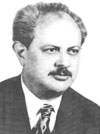
He was born on 13 January 1921 in Timisoara. He completed his piarist grammar school studies in Debrecen. He obtained a university degree in law in this city as well. in 1943.
After being released from a prisoner of war camp, he returned home and worked in Tolna county administration. He was employed as a county clerk as well. In 1949 worked for the Ministry of the Interior Ministry and was responsible for the training of civil servants. His university professor career started at the Budapest University of Economics in 1951 as a university lecturer. In 1956 he was appointed as head of the Department of State Law at the University of Pécs. In 1957 after obtaining a PhD degree he earned the rank of university professor. Between 1957-1964 he was the Dean of the Faculty. In 1962, he obtained a PhD degree in Political Sciences and Law. In 1973 he becama a corresponding member and in 1979 a full member of the Hungarian Academy of Sciences.
He was President of the of the Political Science Committee of the Hungarian Academy, and of the of the Political Science and Law Committee of the Ministry of Culture for ten years. He also was the Vice-President of the Coordination and Information Centre of Social Science (CISS) in Vienna, the President of its Hungarian National Committee, a member of the Executive Committee of International Political Science Society.
In 1973 he became the director of the Transdanubian Research Institute, he opened a new era in the life of the Institute by organizing it into a centre for basic researches in regional development .
Ottó Bihari had a major role in organizing the region’s scientific life, such as the foundation of the Faculty of Economics at the University Pécs and the establishment of the Academic Committee in Pécs, of which he was the Vice-President between 1969-73 and President from 1973 until his death.
His scientific and science organization work was recognized by State Award in 1975.
In particular, he specialised in constitutional law but as the head of TRI his major contribution was introducing the interdisciplinary research of regional issues in the institute. He investigated the theoretical issues of socialist state organization and administration but unlike most of his contemporaries he based his research on a broad sphere of international literature. He wrote several academic books on constitutional law. He actively participated in the preparation of Constitution and other acts such as council acts.